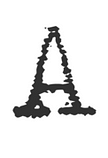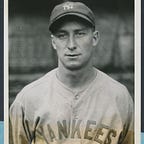Thursday, April 28, 1927: Boston
“Lou, What Do You Think?”
 After two days of games called because of cold and rain, we’re heading up to Boston, where I can’t imagine it will be much warmer.
After two days of games called because of cold and rain, we’re heading up to Boston, where I can’t imagine it will be much warmer.
On board the train before dinner we settle into our positions in the players’ car. A couple of card games, one bullshitting and debating group, a few groups of drinkers, a couple of book readers and, lastly, Urban Shocker on his own, studying his pile of newspapers to see what nuggets he can glean about other teams and players from out-of-town box scores, game accounts and profile articles, while he meticulously takes notes in his personal pitching journal.
Ruth, Gehrig, Mike Gazella and young Don Miller continue an extended game of bridge they first started back in spring training. Miller is a pitcher who has a supernatural ability to throw baseballs exactly where batters like to hit them. Normally this would not bode well for a major league career, but Miller has turned his fatal flaw into a full-time job as our batting practice pitcher, both at home and on the road.
Don Miller even made it into our team photograph, standing right behind Miller Huggins and next to the Babe. It was Schoolboy Hoyt’s idea to sneak him in. (As far as we can tell, neither Huggins nor Ed Barrow have yet to discover that Miller’s in the picture. But we’re sure to hear about it when they do. It will be worth the fines.)
 Ruth and Gehrig are always bridge partners, though they are a rather odd couple. The Babe plays cards just like he plays ball: swinging for the fences, no matter the game, bridge or poker, and no matter the hand. He’s constantly over-bidding by wild amounts, which drives the tightwad Gehrig quietly nuts. Benny Bengough and I love to watch them play, especially when Ruth goes on a particularly nonsensical tear.
Ruth and Gehrig are always bridge partners, though they are a rather odd couple. The Babe plays cards just like he plays ball: swinging for the fences, no matter the game, bridge or poker, and no matter the hand. He’s constantly over-bidding by wild amounts, which drives the tightwad Gehrig quietly nuts. Benny Bengough and I love to watch them play, especially when Ruth goes on a particularly nonsensical tear.
Every now and then, Lou will try in vain to explain to the Babe that winning the bid is not actually the end goal of the game. Ruth’s reply is always the same: “Ah, don’t worry, keed, I got this bridge built.” Once in awhile he’s right. But let’s just say he’s not exactly the Babe Ruth of card players.
While that foursome’s wrapping up their last hand before dinner, down at the other end of the car Schoolboy, Shawkey, Pennock, “Silent Bob” Meusel, Dugan, Lazzeri, Koenig, Benny and I, along with the New York Times writer, Richards Vidmer, are engaged in deep discussion. As usual, Silent Bob is just listening.
(At least, we think Silent Bob listens, but no one’s really quite sure. As Benny points out, Meusel actually could be sleeping with his eyes open, something the writer from the New York American, Ford Frick, accused him of doing in the outfield last season.)
Our topic of discussion this evening, as eloquently first put forth by the erudite Mr. Vidmer:
“Who in the major leagues, outside of the Babe, has paid for the most abortions?”
Ruth, clearly, is in a league of his own in this category, as he is in most things.
The Big Bam not only pays when the paternity could legitimately be his, but he’s also been known to generously pay for friends of friends. At least twice in the little over a year I’ve been on the team, Ruth’s paid for girls he’s never slept with. (“Considering that some of the Babe’s nocturnal commissions range from homely to repulsive,” Schoolboy points out with his impeccable Hoytian logic, “When the Babe says he hasn’t slept with a girl, I take the man at his word.”) One of them was a girl at the the House of Good Shepherd, which sounds like a convent but is actually the Babe’s favorite brothel — in St. Louis it’s basically his home away from home when we’re playing the Browns. The other was the sister of a professional girl in Cleveland that Ruth’s known since his rookie year.
Ballplayers never approach a topic like this frivolously, so this evening’s subject matter engenders a great deal of thoughtful discussion. As Hoyt adroitly points out to us, the candidates have to be both cocksmen and financially generous. That narrows the field considerably.
After a half hour of debate and storytelling, we have it down to two final candidates: Hack Wilson, the Cubs outfielder, who when he was playing in New York for the Giants ran wild off the field, and now by all reports is out of control in Chicago; and my old college teammate, the spectacular cocksman about New York town, Hinkey Haines. Hinkey was a member of the Yankees’ 1923 World Series-winning team and now is a star with the Giants of the National Football League.
My vote will be for Hinkey.
 Back at Penn State—even out in the sticks of State College, even his freshman year—Hinkey showed spectacular nighttime prowess, including one multi-episodic evening that involved three girls, two ladders, a married school teacher, and one shall we say “borrowed” car. Similar to Ruth, neither Hack Wilson nor Haines are overly picky eaters.
Back at Penn State—even out in the sticks of State College, even his freshman year—Hinkey showed spectacular nighttime prowess, including one multi-episodic evening that involved three girls, two ladders, a married school teacher, and one shall we say “borrowed” car. Similar to Ruth, neither Hack Wilson nor Haines are overly picky eaters.
We’re all set to take a show of hands when Lou Gehrig, fresh off another Ruth-inflicted defeat in bridge, wanders down to our end of the Pullman car and — awkwardly, of course — asks: “Hey guys, sure sounds like you’re having fun. Mind if I join you?”
“Sure, Lou,” replies Schoolboy, licking his chops at the thought of what’s to come. “Hey, Sailor Bob and Wop,” he says to Shawkey and Lazzeri, “You boys have some room to slide over don’t ya’?”
“Of course! Lou, slide on in,” Lazzeri says, invitingly.
After some shuffling about, Lou lands snugly between Sailor Bob and the The Wop.
“Lou,” says Herb Pennock, sounding like a school teacher introducing that day’s lesson, “this evening we’re trying to figure out just who in the Majors — aside from the Babe, of course — has paid for the most abortions.”
Shawkey cuts him off: “Lou, what do you think? We’ve narrowed it down to Hack Wilson and Hinkey Haines. Who would you vote for? You remember Hinkey, right? You met him in spring trai — ”
And with that Lou stands straight up and heads back to the other end of the car to bury himself inside one of his Western novels.
Richards Vidmer, watching Lou walk down the car, says ruefully, “Lou’s mom must have called him to come home.”
“Mama Gehrig,” observes Hoyt, “has a voice like a dog’s whistle that only Little Lou can hear.”
Now, every time Lou walks by one of the boys, they pucker up and pretend to silently whistle behind his back.
The joke should be old by October.
